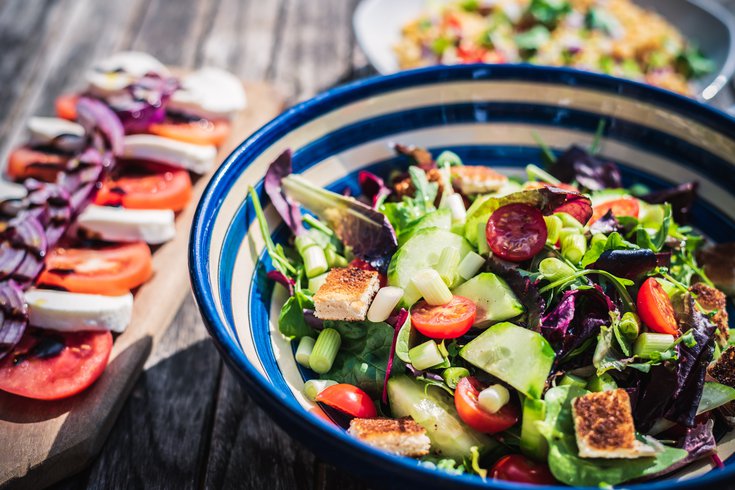
Diabetes patients should eat lots and lots of meat, seafood, eggs and eggs. They should avoid sugar and oil. A diet rich in fruits and vegetables as well as whole grains is a good choice for those who are concerned about their diet. But diabetics can still indulge in non-vegetarian meals and drinks. The following tips are intended to help diabetics create a healthy, balanced diet that fits their lifestyle.
For diabetics, salt and flour can be problematic. These ingredients can raise blood sugar and add unnecessary calories. While you should avoid foods high in sodium, there are still options to incorporate them into your meal plans without having to compromise your diet. Whole foods are healthier than refined sugar and should make up the majority of a diabetes diet menu. The key to avoiding processed foods and frozen foods is to eat as few as possible.

A balanced diet with carbohydrates, proteins and fat is the best way to manage diabetes. You don't have to go overboard with the carbohydrates and healthy oils, but you do want to be mindful of what is best for your body. A diabetes-friendly diet menu should have a balance of all three types. Fiber and protein are slowing agents in the digestion process of carbohydrates. While protein and fiber will provide more nutrition and boost blood sugar levels, both will be beneficial. It is crucial to keep track of your food intake and monitor your blood glucose levels if you have diabetes.
The diabetic diet menu should reflect your child's current diet. The main focus of this diet is on carbs, as these can spike your blood sugar level. Diabetic diets should avoid breads, pasta, and instead focus on fruits and vegetables. Both fruits, as well vegetables, are rich source of fiber and antioxidants. Use whole fruits instead of juices. Avoid eating fruit right after meals, as they can spike blood glucose levels.
Oatmeal cooked in oatmeal is rich in soluble fiber. This helps regulate blood sugar levels and promotes good heart health. Oatmeal is rich in fiber which can help lower insulin levels. It is low in calories but high in fiber so it is a good choice for diabetics. However, a diabetic diet must include fruits, veggies, and nuts in order to reduce the likelihood of developing type 2 diabetes.

The glycemic index should be used to determine the diabetic diet. This index ranks carbohydrate-containing foods by their effect on blood sugar. A dietitian can help guide you in choosing foods that are right for you. You can also have a diet plan tailored to your lifestyle and goals. With the right nutrition, you can maintain a healthy body and achieve your diabetes-friendly lifestyle. You should not eat too many of any one thing.
FAQ
Can I consume alcohol while working out?
Yes. Alcohol increases energy expenditure, speeds up recovery times, and reduces soreness.
Additionally, alcohol can increase insulin sensitivity and make it easier to absorb glucose.
However, alcohol can lead to dehydration that can slow down your metabolism. You may also experience a reduction in testosterone production which can lead to decreased muscle-building potential.
Women shouldn't consume alcohol before exercising. Women who have consumed a lot of alcohol should wait at most 24 hours before working out.
Nursing mothers should abstain from alcohol as much as they can.
Men should limit their alcohol intake to just one drink each day.
Eggs good for men
All nutrients are contained in the egg. It aids in maintaining strong bones, healthy hearts, and lungs, as it also maintains stable blood pressure.
Eggs are an excellent source protein, vitamins A,B12, D E, K and calcium. They also contain vitamin B12, D-E, K, calcium and phosphorus.
Egg yolks are high in cholesterol. However, the egg yolk is low in cholesterol. Eggs contain less saturated fat than most other foods.
They are also low on calories and sodium. They can also be prepared in many different ways. They can be fried, poached, scrambled, boiled, hard-boil and baked.
They are incredibly nutritious and easy to prepare.
Each day, you should consume at least 2 whole eggs. Avoid eating eggs.
Our bodies need eggs to provide the essential nutrients they require. Try adding them to your daily diet today.
Cardio Exercise: Good or Bad for Your Health?
Cardiovascular exercise offers many benefits. It increases blood circulation, strengthens the heart muscle, boosts stamina, aids in weight loss, and gives you more energy.
Cardiovascular exercise includes running, biking, hiking, swimming, tennis, basketball, soccer, volleyball, football, etc.
It is important to remember that cardio exercises should not be performed at high-intensity levels. This could lead to injury.
If you feel fine, only do the cardiovascular exercise.
Never push yourself past your limits. If you do, you might injure your self.
When you engage in cardiovascular exercise, it is best to warm up first. You can then gradually increase your intensity.
Always listen to your body. If you feel pain, stop doing cardio exercise immediately.
After a cardiovascular training session, it is recommended that you take some time to relax. This allows your muscles time to recover.
Cardiovascular exercise is essential for losing weight.
It is the best way for you to lose calories and decrease belly fat.
Statistics
- An estimated calorie range for moderately active adult males falls between 2,200 to 2,800 calories per day, depending on age. (eatright.org)
- Get free shipping and 25% off today. (healthline.com)
- 10 pounds in a month is likely during a lean bulking phase, especially for beginners. (muscleandstrength.com)
- By John Thompson Take a whopping 38% off a set of PowerBlock Pros. (menshealth.com)
- Cardmembers earn 5% Back at Amazon.com with a Prime Credit Card. (amazon.com)
External Links
How To
What is the healthiest food for men?
Men should consume five servings of fruits or vegetables per day. Men should also limit their consumption of red meat and avoid fast food.
Vegetables and fruits are rich in antioxidants, which can protect against cancer and cardiovascular disease.
Vegetables include broccoli, cauliflower, carrots, spinach, tomatoes, peppers, cucumbers, lettuce, mushrooms, etc.
Peas and beans are also high in protein and fiber.
Excellent sources of omega-3 oils are nuts and seeds. Omega-3 fatty acid is essential for the brain and hormone production.
Fish is another good source of omega-3s. Mercury is more abundant in fish than in most other meats. However, fish liver oil does contain fewer toxins.
It is necessary to have a healthy growth rate and develop your brain.
Poultry provides a lot of lean meat. Chicken breast is the most nutritious meat.
Lean beef contains low amounts of saturated fats and cholesterol. Red meat should be limited as too much iron can increase your chances of developing prostate cancer.
Avoid processed meats such as sausage and hot dogs. These have added nitrates which can be carcinogenic.
There is no doubt that exercise is essential for maintaining overall health. You may already be working out on a regular basis. What can you do to improve or maintain your physical condition?
The answer is yes You can do many things to ensure you get the most out your workouts. Here are some tips to help you maximize your workout.
Take it slow. Injure yourself if your first session is too intense. You can start slowly increasing your intensity by starting at a comfortable pace.
Stretch before and afterwards. Stretching can help to loosen tight muscles, decrease soreness, improve flexibility, and reduce pain. You can stretch standing up, sitting down, or walking around.
Cool down. This is particularly important when doing cardio exercises. So that your body doesn't become exhausted, it needs to be able to recover between sessions. For cooling down, you can walk slowly, take deep breathes, or go for short swim.
Hydrate. Hydration is key to reducing muscle cramps and keeping you hydrated. Water is the ideal beverage, but sports drinks may also be helpful.
Eat right. You should eat enough calories every day. Regular meals throughout the day will help keep you energized and focussed during your workouts.
Get some sleep. Get enough rest to feel refreshed and ready to tackle your next training session. Sleep is also crucial for repairing damaged tissues.